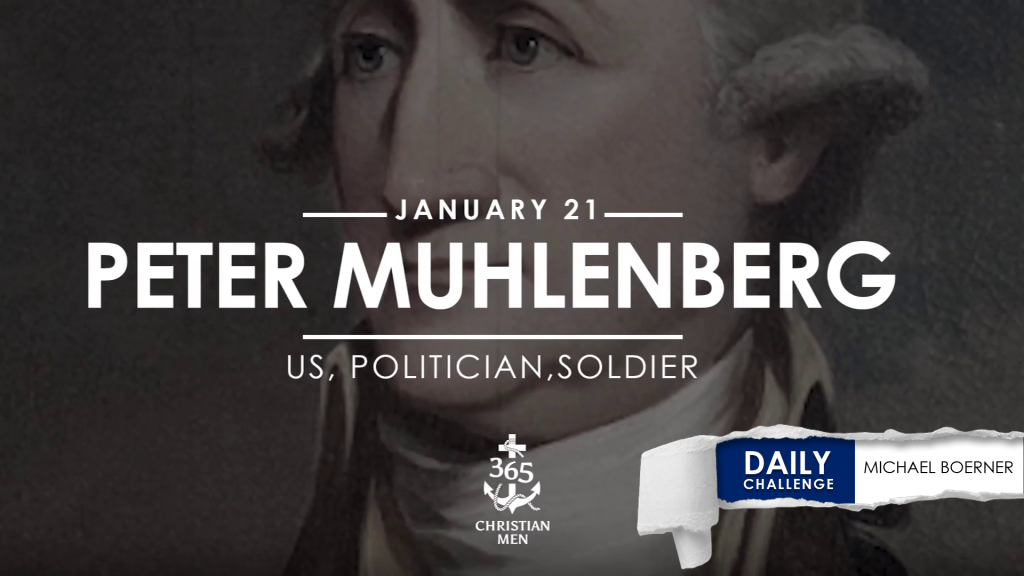January 21. Peter Muhlenberg. When Peter was in his early twenties and a mere deacon, a family friend suggested Peter might make a good missionary to Native Americans. But Peter’s father vetoed the idea and said Peter might ‘turn Indian sooner than turn the Indians Christian.’”
But Peter knew how to work hard. When he was assigned a job, he did it. He could be counted on. He became a real pastor. On this date in 1776, Peter preached his farewell sermon, recruited a battalion, and led them into the war.
By the time his life story was done, Peter had been promoted to brigadier general and assigned to George Washington’s army in Pennsylvania.
But today’s story starts in Peter’s early days, when he first arrived in North America to preach.
There’s a time to talk and a time to fight. Be like those who don’t shrink back.
Lutheran minister Peter Muhlenberg was only twenty-nine years old, but this young man could work. He spoke German and English, and anytime the Lord called him to a task, Peter was right there.
Preaching, baptizing, marrying, and burying, he pastored two English-speaking churches and six German-speaking churches—all at the same time. The congregations were spread far apart, even up to a hundred miles, and the previous rector had only managed to see some of them twice a year.
But Peter managed it and fished and hunted with his parishioners and gained their friendship, their respect, and their trust.
Because of his education and his ability to speak both German and English, he got pressured to become magistrate for the newly formed region.
But Peter wrestled with the idea of political service. Should he, a preacher, participate in government? Some of his fellow spiritual leaders said no. He wasn’t sure, so a few months later he resigned his post as magistrate. However, the people voted him Chairman of the Committee of Correspondence, a phantom government created in the shadows by the Colonies. They spread the colonial interpretation of British actions among the colonies and to foreign governments.
This time, he accepted that serving his congregation meant seeing to both their spiritual and civic needs. He wrote to his brother: “I am again chosen chairman, so that, whether I choose or not, I am to be a politician.” Holding this post automatically made him Dunmore County’s representative to Virginia’s Convention.
And that is how the political leadership learned about the extraordinary qualities of Peter Muhlenberg.
Early in 1776, Virginia’s Revolutionary leaders formed eight new battalions, one of them to be German speaking. And—of course—they chose Peter to lead this unit.
Peter continued to work in church and government, but the new call to serve his community required an even greater step of faith—to resign his spiritual and civic leadership posts and step into a role of military authority.
He knew God had called him to serve the people of Virginia—especially the German-speaking population. So he saw this military appointment to be God’s invitation to use his leadership skills in a new way. He accepted the commission of colonel.
On January 21, 1776, Peter donned his ministerial robes one last time and preached a rousing farewell sermon. He told his congregation that the time for preaching and praying had passed; now was the time to fight. After the congregation sang “A Mighty Fortress is Our God,” Peter spoke the benediction and pulled off his ministerial robes.
He was dressed in his military uniform.
Stepping down from the pulpit, he strapped his sword to his side and recruited an entire battalion from his congregation. Several hundred men answered his call. And Peter led them.
“Therefore, do not throw away your confidence, which has a great reward. For you have need of endurance, so that when you have done the will of God, you may receive what was promised.… But we are not of those who shrink back to destruction, but of those who have faith to the preserving of the soul” (Hebrews 10:35–36, 39 NASB).
Is there a strength God has given you that He is asking you to use? There’s a time to talk and a time to fight. Be like those who don’t shrink back.
Hocker, Edward W. The Fighting Parson of the American Revolution: a Biography of GENERAL PETER MUHLENBERG, Lutheran Clergyman, Military Chieftain, and Political Leader. (Philadelphia: Published by the author, 1936) p 59. Accessed September 9, 2020. https://babel.hathitrust.org/cgi/pt?id=mdp.39015027039075&view=1up&seq=7.
Smith, George M. “THE REVEREND PETER MUHLENBERG: A SYMBIOTIC ADVENTURE IN VIRGINIA, 1772–1783.” p 55, 56. Accessed September 9, 2020. https://loyolanotredamelib.org/php/report05/articles/pdfs/Report36Smithp51-65.pdf.





